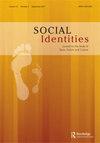Strengths and limits of limitless English in India: a critical reflection on the relationship of English to a backward community
IF 0.7
Q3 ETHNIC STUDIES
引用次数: 0
Abstract
ABSTRACT English, initially being a language of imperial leaders and later of upper caste elites after independence, continues to remain an elitist language in India. Over the course of time and for various reasons, the need for English language learning has rapidly increased. English is also believed to promote social mobility for the people of backward communities. However, the history of social disparity in India has problematized the position of English in the country. On one hand English produces varied possibilities for economic growth and social change. On the other hand, its elitist and exclusively selective nature negatively impacts Indian society by alarming the public education sector which the most backward communities rely on even today. Even though someone from a backward community succeeds in learning English they would inevitably step into a more complex/hierarchical zone by positioning themselves in the complexity of a class structure.印度无限英语的优势与局限:对英语与落后社会关系的批判性反思
摘要英语最初是帝国领导人的语言,后来独立后成为上层种姓精英的语言,但在印度仍然是一种精英语言。随着时间的推移,由于各种原因,对英语学习的需求迅速增加。英语也被认为可以促进落后社区的人们的社会流动性。然而,印度社会差异的历史使英语在该国的地位出现了问题。一方面,英语为经济增长和社会变革带来了各种可能性。另一方面,它的精英主义和纯粹的选择性对印度社会产生了负面影响,使最落后的社区即使在今天也依赖的公共教育部门感到担忧。即使来自落后社区的人成功地学习了英语,他们也会不可避免地进入一个更复杂/层次更高的区域,将自己定位在复杂的阶级结构中。
本文章由计算机程序翻译,如有差异,请以英文原文为准。
求助全文
约1分钟内获得全文
求助全文
来源期刊

Social Identities
ETHNIC STUDIES-
CiteScore
2.00
自引率
0.00%
发文量
22
期刊介绍:
Recent years have witnessed considerable worldwide changes concerning social identities such as race, nation and ethnicity, as well as the emergence of new forms of racism and nationalism as discriminatory exclusions. Social Identities aims to furnish an interdisciplinary and international focal point for theorizing issues at the interface of social identities. The journal is especially concerned to address these issues in the context of the transforming political economies and cultures of postmodern and postcolonial conditions. Social Identities is intended as a forum for contesting ideas and debates concerning the formations of, and transformations in, socially significant identities, their attendant forms of material exclusion and power.
 求助内容:
求助内容: 应助结果提醒方式:
应助结果提醒方式:


